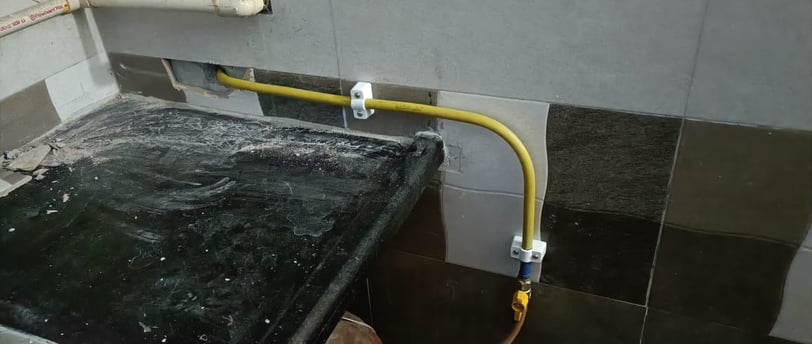Gas Pipeline Safety Tips for Homeowners
Ensuring the safety of your gas pipeline is crucial for the well-being of your family and your home. Follow these essential safety tips to maintain a secure and efficient gas pipeline system
PRIME GAS PIPELINE
10/5/20242 min read


1. Schedule Regular Inspections
Have your gas pipeline system inspected by a qualified professional at least once a year. Regular inspections help identify potential issues before they become dangerous.
2. Know the Warning Signs of a Gas Leak
Familiarize yourself with the warning signs of a gas leak, such as the smell of rotten eggs, hissing sounds, or dead vegetation around your pipeline. Acting quickly can prevent serious accidents.
3. Install Gas Detectors
Install natural gas detectors in key areas of your home, such as the kitchen and basement. These detectors provide an early warning if gas levels become unsafe.
4. Avoid Blocking or Damaging Gas Lines
Ensure that gas pipelines are not obstructed or damaged by heavy furniture, renovations, or landscaping activities. Always be aware of pipeline locations before digging or drilling.
5. Teach Your Family Safety Measures
Make sure everyone in your household knows how to detect a gas leak, shut off the gas supply, and evacuate the premises if necessary. This knowledge is essential in an emergency.
6. Never Ignore the Smell of Gas
If you detect a gas odor, do not attempt to locate the leak yourself. Leave the building immediately and contact your gas provider or emergency services for assistance.
7. Check for Proper Ventilation
Ensure that rooms with gas appliances have adequate ventilation. Proper ventilation prevents the accumulation of dangerous gases, reducing the risk of carbon monoxide poisoning.
8. Handle Gas Appliances Safely
Only use certified gas appliances and ensure they are installed by a professional. Avoid using defective or outdated appliances, as they can pose serious risks.
9. Avoid Using Open Flames Near Gas Lines
Keep open flames, such as candles or lighters, away from gas lines or appliances, especially if you suspect a leak. Open flames can ignite the gas, leading to a fire or explosion.
10. Inspect Connections Regularly
Regularly inspect connections to gas appliances, such as stoves or water heaters, to ensure they are secure and free of leaks. Replace worn or damaged connectors promptly.
11. Know How to Shut Off Your Gas Supply
Locate your gas shut-off valve and learn how to operate it. In case of an emergency, turning off the gas supply can prevent an escalation of the situation.
12. Keep Emergency Contact Numbers Handy
Keep the contact numbers for your gas provider and local emergency services in an easily accessible place. This ensures you can get help quickly if needed.
13. Avoid DIY Repairs
Gas pipeline repairs should only be handled by licensed professionals. Attempting DIY fixes can lead to more serious problems and increase the risk of accidents.
14. Maintain Proper Clearance Around Gas Appliances
Ensure that there is sufficient space around gas appliances for ventilation and maintenance. This reduces the risk of overheating or gas accumulation.
15. Regularly Check Gas Bills for Unusual Increases
If your gas bill suddenly increases without a clear reason, it could indicate a gas leak. Contact a professional to inspect your system for any issues.
Prime Gas Pipeline Installation Services in Hyderabad
Best gas pipeline installation service in Hyderabad Secunderbad ensuring safety.
Contact Us Now
PrimeGasline28@gmail.com
+91 9666106900
© 2024 Prime Gas Pipeline Service. All Rights Reserved
Our Services
Gas Pipeline Installation
Gas Pipeline Repairs
Gas Appliance Service
Prime Gas Pipeline Service is dedicated to providing superior gas pipeline installation solutions efficiency. Serving residential properties with expertise and precision, we ensure that every project is completed to the absolute satisfaction of all our clients.
Our Gas Pipeline Installation Service Locations In Hyderabad & Secunderabad
Gas Pipeline fitting In Hyderabad & Secunderabad, Gas Pipeline fitting In Pragathi Nagar, Gas Pipeline fitting In Bachupally, Gas Pipeline fitting In KPHB, Gas Pipeline fitting In Panjagutta, Gas Pipeline fitting In Ameerpet, Gas Pipeline fitting In Sai Nagar, Gas Pipeline fitting in Moosapet, Gas Pipeline fitting In Kukatpally, Gas Pipeline fitting In Nizampet, Gas Pipeline fitting In Miyapur, Gas Pipeline fitting In Lingampally, Gas Pipeline fitting In Patancheru, Gas Pipeline fitting In Secunderabad, Gas Pipeline fitting In Banjarahills, Gas Pipeline fitting In Jubilee Hills, Gas Pipeline fitting In Madhapur, Gas Pipeline fitting In Hitech City, Gas Pipeline fitting In Kondapur, Gas Pipeline fitting In Gachibowli, Gas Pipeline fitting In Nallagandla, Gas Pipeline fitting In Tellapur, Gas Pipeline fitting In Manikonda, Gas Pipeline fitting In Chintal, Gas Pipeline fitting In Jeedimetla, Gas Pipeline fitting In Alwal, Gas Pipeline fitting In Malkajgiri, Gas Pipeline fitting In Sainikpuri, Gas Pipeline fitting In Ecil, Gas Pipeline fitting In Tarnaka, Gas Pipeline fitting In Uppal, Gas Pipeline fitting In LB Nagar, Gas Pipeline fitting In Dilsukhnagar.
